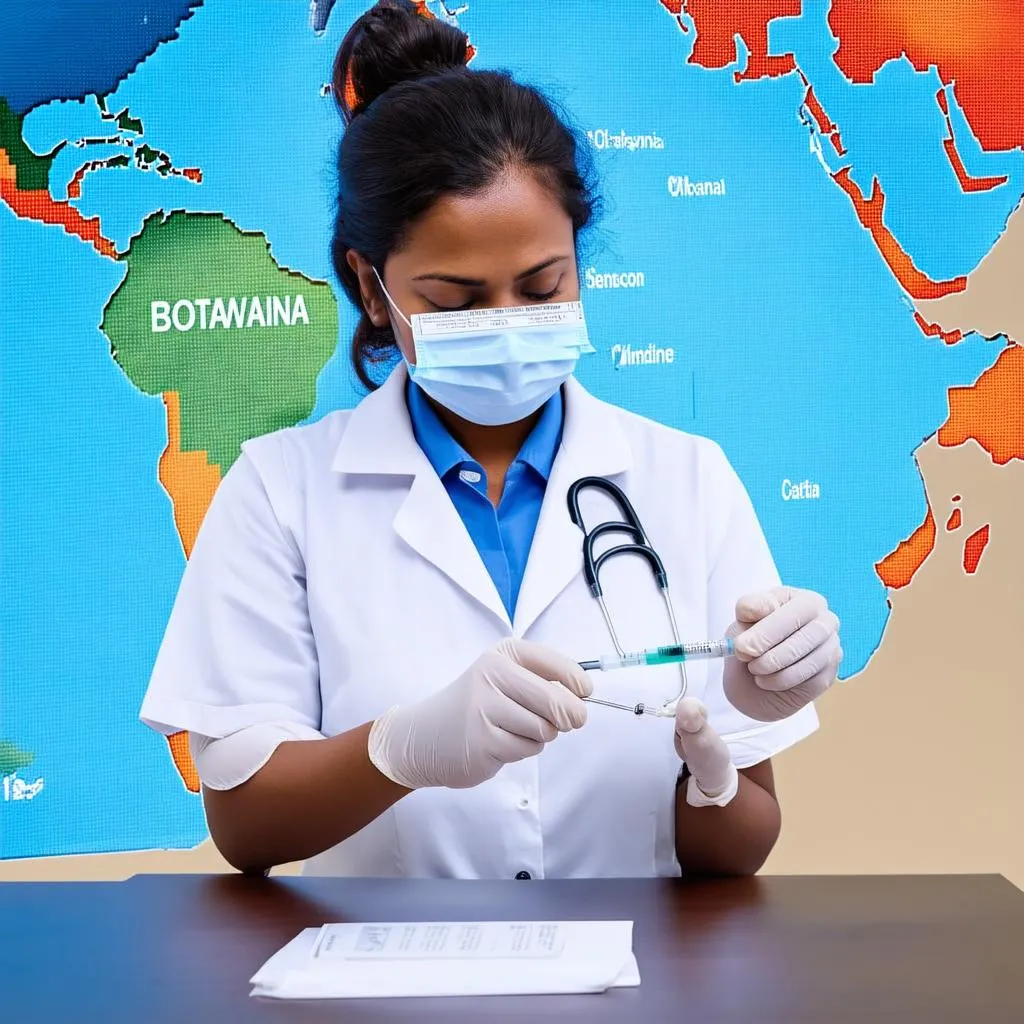Planning an African safari? A trip to Botswana should be on your bucket list! This beautiful country boasts stunning landscapes, incredible wildlife viewing opportunities, and rich cultural experiences. But before you pack your bags and book your flights, you might be wondering: Are Any Shots Required For Travel To Botswana?
Let’s dive in and ensure you’re prepared for a safe and healthy journey to this mesmerizing country.
Vaccinations for Botswana: What You Need to Know
While Botswana doesn’t have any mandatory vaccination requirements for entry, there are some recommended vaccinations and health precautions to consider for a safe and enjoyable trip.
Routine Vaccinations
First and foremost, ensure your routine vaccinations are up-to-date. These include:
- Measles, Mumps, Rubella (MMR): This is especially important if you haven’t had the vaccine or contracted these diseases.
- Diphtheria, Tetanus, Pertussis (DTaP): This booster shot is recommended every ten years.
- Polio: Ensure your polio vaccination is up-to-date.
- Chickenpox: If you haven’t had chickenpox or the vaccine, consider getting vaccinated.
- Influenza: The flu virus is unpredictable, so getting the annual flu shot, especially during flu season, is a good idea.
Recommended Vaccinations for Botswana
Besides routine vaccinations, health professionals recommend certain vaccinations specifically for travelers heading to Botswana. These include:
- Hepatitis A: This highly contagious liver infection is preventable through vaccination. It spreads through contaminated food and water, a risk factor in some areas of Botswana.
- Hepatitis B: This viral infection affects the liver and is spread through contact with infected blood and bodily fluids. While the risk is generally low for most travelers, it’s a good idea to get vaccinated, especially if you plan on getting medical care in Botswana.
- Typhoid: This bacterial infection spreads through contaminated food and water. Vaccination is recommended, especially if you plan on venturing off the beaten path or eating at smaller, local restaurants.
- Rabies: While rabies vaccination is not typically required for all travelers, it’s worth considering if you plan on spending extended time in rural areas, working with animals, or participating in activities like hiking or camping where exposure to animals is more likely.
 Botswana Vaccination
Botswana Vaccination
Other Health Precautions
In addition to vaccinations, take the following precautions to stay healthy during your Botswana adventure:
- Malaria Prevention: Malaria is present in some parts of Botswana. Consult your doctor about antimalarial medication, use mosquito repellent (containing DEET), sleep under mosquito nets, and wear long-sleeved clothing, especially at dawn and dusk.
- Travel Health Insurance: Ensure you have comprehensive travel health insurance that covers medical emergencies, including evacuation.
- Safe Food and Water Practices: Drink bottled water, avoid tap water and ice, and ensure your food is thoroughly cooked.
- Sun Protection: The African sun is strong! Pack sunscreen (SPF 30 or higher), a hat, sunglasses, and lightweight, light-colored clothing to protect yourself from harmful UV rays.
Planning Your Botswana Adventure: Tips from Travelcar.edu.vn
Now that you’re informed about the necessary health precautions, let’s talk about planning your Botswana trip! TRAVELCAR.edu.vn, your trusted source for travel information, offers valuable resources and insights to help you craft an unforgettable journey:
- Explore the Okavango Delta: This UNESCO World Heritage Site is a must-see, offering a unique safari experience in a mesmerizing water wonderland.
- Discover the Chobe National Park: Renowned for its large elephant herds, Chobe National Park offers incredible wildlife viewing opportunities.
- Experience the Makgadikgadi Pans National Park: Witness the stark beauty of the Makgadikgadi salt pans, a vast and otherworldly landscape.
 Okavango Delta, Botswana
Okavango Delta, Botswana
Feng Shui and Travel: Harmonizing Your Journey
Incorporating Feng Shui principles into your travel plans can enhance your journey and promote a sense of balance and harmony. Consider these tips:
- Pack thoughtfully: Choose luggage in colors that resonate with you and pack items that bring you joy and comfort.
- Choose accommodation wisely: Opt for accommodations that feel inviting, well-lit, and have a sense of flow.
- Embrace the journey: Allow yourself to be present and open to new experiences. Approach your travels with a sense of gratitude and adventure.
Frequently Asked Questions
Q: Do I need a yellow fever vaccine for Botswana?
A: While Botswana does not require a yellow fever vaccine for entry from most countries, a yellow fever vaccination certificate is required if you are traveling from a country with a risk of yellow fever transmission. It’s best to check with your local health authorities or the Botswana embassy/consulate in your country for the most up-to-date information.
Q: Are there any specific health risks for older travelers?
A: Older travelers should take extra precautions to stay hydrated, avoid strenuous activities during the hottest part of the day, and carry any necessary medications. It’s also crucial to have comprehensive travel insurance that covers pre-existing conditions.
Q: What should I pack in my first-aid kit?
A: A well-stocked first-aid kit is essential. Include essentials like pain relievers, anti-diarrheal medication, antiseptic wipes, bandages, motion sickness medication, insect repellent, and any personal medications.
Stay Informed, Travel Safe
Remember, consulting a travel health specialist is essential to get personalized recommendations based on your health history, itinerary, and planned activities. They can provide the most up-to-date information on required and recommended vaccinations and necessary health precautions for your Botswana trip.
Safe travels, and enjoy the incredible beauty of Botswana!
Disclaimer: The information provided in this article is for general knowledge and informational purposes only, and does not constitute medical advice. It is essential to consult with a qualified healthcare professional for any health concerns or before making any decisions related to your health or treatment.

